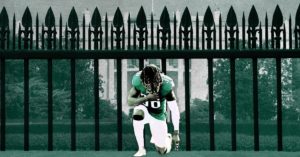
Did Le’Veon Bell Make the Right Move?
If you are a fan of the the Pittsburgh Steelers, or the NFL, or follow sports in general, then chances are you are familiar with the Le’Veon Bell saga. If you’re not I’ll catch you up quickly and move on to make sense of what has transpired.
The Pittsburgh Steelers franchise tagged Le’Veon Bell for the 2017 season and again in 2018. The franchise tag in the NFL allows NFL teams apply to a player scheduled to become an unrestricted free agent. A franchise player must be offered a one-year contract for an amount no less than the average of the top five salaries at the player’s position as of a date in April of the current year in which the tag will apply, or 120 percent of the player’s previous year’s salary, whichever is greater. Franchise players cannot negotiate with other teams. The team has all the negotiating rights to the franchise player.

Le’Veon Bell two time All Pro, 3 time pro bowler
The Steelers tagged Le’Veon Bell as the franchise player in 2017, at which time he sat out the pre-season but played the duration of the regular season earning the full value of $12.2 million of the franchise tag for running backs that season. Bell and the Steelers could not come to an agreement prior to the 2018 season and the Steelers opted to tag Bell for a second consecutive year.
Tagging a player two consecutive years comes at a greater price to the team. Tagging a player two straight years requires the team to pay 120 percent of the player’s previous year’s salary. For Bell that meant being paid $14 million plus in 2018. If they wanted to tag him a third year the price jumps to 144 percent, or an average of the top 5 salaries at the highest paid position (probably Quarter Backs) – whichever is the highest.
This is where things get tricky. Bell wanted a deal commensurate with his production and value according to he and his agent’s assessment. I can’t say for sure what Bell was asking, but according to Ian Rapoport of NFL.com, Bell turned down 5 years, $70 million with $30 Million guaranteed over 2 years. So whatever he’s asking for is more than that. While some will scoff at his rejection, Todd Gurley of the Los Angeles Rams received a four-year, $60 million deal that includes $45 million in guarantees and a signing bonus of $20 million. Both the per-year and the total guarantees are the highest ever for a running back according to Forbes. If I had to guess Le’Veon wants something closer to what Todd Gurley received or more.
Bell may have a good argument for his contract demands based on his production between 2013, when he entered the league and 2017. According to Pro Football Reference, he’s been the most productive non quarterback player in league history in his first 5 seasons. In the 5 seasons he’s played he as produced 7,996 yards from scrimmage, no one has done this in their first 62 games, and the next closest on the list is Eric Dickerson at 7,842. With that type of production Bell firmly believes he should be paid accordingly.
The next phase in the saga is really where the controversy begins. As previously stated, Bell was set to earn $14.54 million in 2018 if he signed his franchise tender and played in all 16 games. Instead of signing and playing out his last season in Pittsburgh, Bell opted to sit out the entire season. To the average person making $50,000 a year, this sounds like an insane move. How could he leave $14 million just sitting on the table? Mind you Bell isn’t sitting out to negotiate for more money this year, he’s been franchised so if he wanted to play in 2018 it was set in stone that his salary was the $14 million. Bell opted to sit out to preserve his body for his next contract and presumably his next team.
Le’Veon Bell is a running back with wide receiver soft hands and dynamic run after the catch ability. That skill set translated into 1,541 ball touches over his first 5 seasons in the league, which breaks down to 398 touches per season, or nearly 25 per game. To say he’s a workhorse is an understatement. Bell understanding that he’s not a quarterback, who the league has reworked rules to protect above every other position, didn’t want to take the chance of injury.

Le’Veon is betting on his production in free agency
There are a number of variables to be considered here in making a decision on the intelligence of this move, but I tend to hang with Bell here. Yes, his franchise tag for this year is $14 million, and by not playing he can never recoup that money, it’s gone. Bell’s looking long term, and he may have some justification based on another player’s misfortune this season in a similar situation. Earl Thomas of the Seahawks signed his tender, played, and in week four of the season broke his leg and ended his season. Yes, Earl’s contract is guaranteed this year, but he was scheduled to be a free agent at the end of this season. What is his value going into his next contract coming off of a broken leg? How much will that broken leg cost him in terms of guaranteed money on his next deal? Will teams want to see Thomas perform on another 1 year deal before committing to him long term? Thomas will be one year older, with more tread on his tires, another possibility for injury with no long term security, that’s his reality.
I get the argument you can blow out a knee getting out of the shower so you take the money and take your chances, but again at his position the chances of him getting hurt as a running back are even higher than Earl Thomas’ who plays safety, and are even higher still because of the number of times he touches the ball per game and season.
The bottom line here is that while Bell is not playing this year, he will be a year older, and will be a bit rusty, but does anyone really think that the guy who racked up more yards than Eric Dickerson in his first 5 years is all of a sudden going to turn into Trent Richardson? The reality is, whoever Bell plays for next year will get the same dynamic player that averaged 130 yards per game in 2017. What that also means is that while a majority of teams may want to punish him for bucking the system, there will be 1 team out there with a general manager and an owner willing to back up the Brinks truck to get him, for example Andrew Luck and the Colts are probably shoveling cash into the back of a van as we speak.
The other aspect of this is that most people criticizing Bell didn’t make $12.2 million dollars last year, or the $30 Million he’s made over the life of his career. He’s not hurting for cash. When you’re already made enough money to be generationaly rich, it’s an easier pill to swallow if you opt to bypass millions in the effort to more than double your career earnings over night. If he signs a deal anywhere near what Todd Gurley signed this summer, he will feel vindicated. That being said, many will still criticize him because he could have had the $14 million on top of whatever his next deal is, barring injury, and I get that argument as well.
The remaining question, is what will Bell’s actual status be at the end of this season? Because he opted to not play or sign his franchise tender, can the Steelers tag him again under the 2nd year franchise tag instead of having to tag him under the 3rd year meaning they pay him top five quarterback money? The short answer is likely no. The Steelers could argue the point that Bell never signed his tender and therefore they should be able to tag him again at the same $14 million, but there is a report from the Austin Knoblauch that Pittsburgh has no intentions to argue the point and has accepted the 2019 tag would be at the third year cost.

James Conner is proving that the Steelers can move on from Bell in 2019
If you’re an NFL agent reading this or are familiar with the NFL CBA and the various tags that are out there, you’re probably screaming about the transition tag at this point. The transition tag is similar to the franchise tag, but allows for the player to negotiate with other teams, and allows the team that tagged the player to match offers from other teams (right of first refusal). If the Steelers were to match the offer from another team, Bell would still be a Steeler under this new contract. The issue with this, is that if the Steelers do no match an offer from another team, the Steelers receive nothing in return. If they do not use the transition tag on Bell and let him walk in free agency, they can receive compensatory draft picks for the loss of a marquee player. The other caveat to the transition tag is that the Steelers could do a sign a trade, meaning they let Bell negotiate, hope the market punishes him for sitting out, sign him at a lower cost, then trade him to the highest bidder.
As a long time Steeler fan, I can tell you this organization hates for contract situations to play out in the media. This situation with Bell has been one of the worst in recent memory. The best scenario for the organization would be to transition tag him and hope for a sign and trade deal. The reality is that I believe the team has moved on and are done with Bell at this point. Again my opinion but the team is comfortable with Conner as the replacement and will continue to add depth at the position via the draft and possibly free agency. While Bell was a critical piece to the offense, the performance of the offensive line over the since o-line Mike Munchack’s arrival has been the jewel in the offense’s crown. The Steelers want to win on the field and have as little non-football related drama as possible. Continuing this saga with Bell only exacerbates the latter. In my opinion the Steelers opt for a clean break with Bell after the season. Full disclosure per a bet with a personal friend I need this to be right.
Steve
Steve is an affordable multifamily housing professional that is also the co-founder of Whiskey Congress. Steve has written for national publications such as The National Marijuana News and other outlets as a guest blogger on topics covering sports, politics, and cannabis. Steve loves whiskey, cigars, and uses powerlifting as an outlet to deal with the fact that no one listens to his brilliant ideas.



